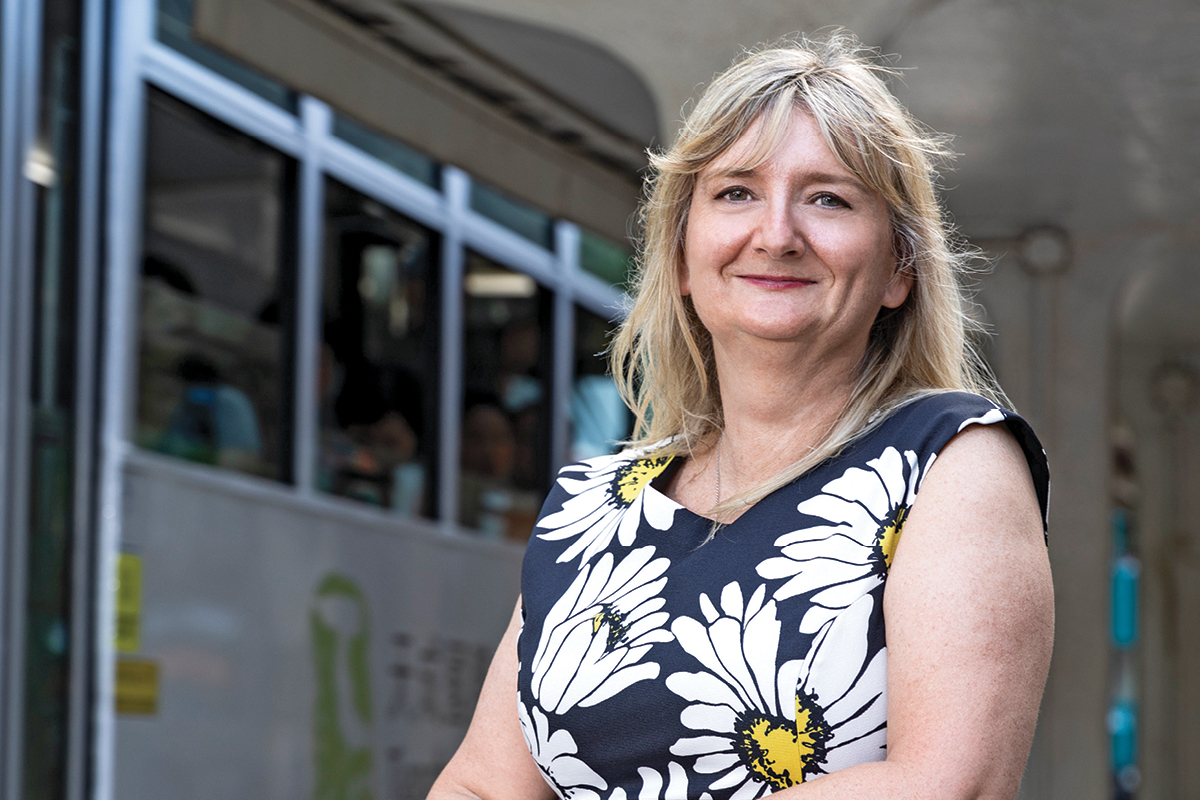Duty of care: Linda Wills
Transitioning from an extensive career as a nurse to Executive Director of OT&P Healthcare, Linda Wills believes in providing high-quality care by taking the time to listen to patients’ needs
After starting her career in nursing in the United Kingdom, Linda Wills has worked in multiple countries, from Saudi Arabia to Oman to now Hong Kong. The Executive Director of OT&P Healthcare enjoys working in Hong Kong because of how efficient it is and being able to live and work with different cultures.

"The city is so organised and things are open 24/7," Linda says. "Hong Kong has a great cultural mix between expatriates and locals."
Linda initially worked in intensive care and has a lot of experience in children’s nursing. However, as she developed her career, she started to think about how the quality and issues in hospitals could improve.
"I quickly joined quality committees to see how improvements could be made, and then did further study so that I could improve my knowledge in risk management in governance and quality, and health and safety," she recalls.
"My career path evolved, and I enjoy dealing with the quality and risk management side. I also did some management courses to help me improve my skills in managing hospitals and, eventually, clinics."
Linda was inspired by Dr Tim Trodd and Dr David Owens, the founding partners of OT&P Healthcare – one of Hong Kong’s leading healthcare providers – and knew they were dedicated to individualised patient care.
"I saw quality improvement as a key goal of the company," she reflects. "I also knew from staff who worked there that they were good employers and were liked by staff."
From nurse to Executive Director, Linda is proud to have made her way into senior management. "I have worked my way up to Executive Director and Partner of a successful healthcare company," she beams.
"Along the way, I have helped organisations achieve clinical accreditation, which ultimately has improved the quality of care for patients. This is both in hospitals and clinics I have worked at and some that I have been a consultant to."
"I’ve been able to help clinics and hospitals I’ve worked in over the years improve their quality and have the quality recognised by achieving accreditation for them."
OT&P’s core value is nothing less than excellence in quality, with the company providing individualised care to patients. "We need to spend time with patients to give them the best care," she says.

"For instance, patient appointments with a general practitioner are 15 minutes in OT&P, whereas in other clinics the patient only has a five-minute appointment," Linda explains.
"When the patient comes for the first time to register with us, we meet with them for 30 minutes so that we can understand their background. This way, we can help them move forward. We want to promote health, so we do health screenings, and we provide workshops so that we can help patients help themselves to improve their health."
In 2010, OT&P obtained Australian Council on Healthcare Standards (ACHS) accreditation, which is endorsed by the International Society for Quality in Health Care, the body that oversees healthcare standards worldwide.
To maintain high-quality care, the company has a platform to ensure it follows ACHS standards. "We adapt our policies and procedures around those standards, which are based on international evidence-based care," Linda explains.
"The staff must follow the policies, and we do orientation and regular training. We learn from our patients and do patient surveys," she continues.
"We have an open culture for discussing incidents, complaints are followed up, and we look at root cause to understand the underlying problem and identify areas that may need improvement."
When the company began in 1994, it offered mostly GP services and an obstetrician. After listening to the needs of patients, it has now added numerous specialist services from orthopaedic surgery and ophthalmology to sports medicine, and it continues to expand its services over five clinics.
"We listened to what our patients wanted and we’ve increased their services," Linda says. "We’ve looked at where our patients live and where they want these services so that we can set up clinics there. We’ve also built our own digital IT system, which connects all clinics. So, if somebody’s sick at home and they decide to go to one of our outlying clinics, they can see the doctor there, as all the notes and medications are on the system."
"We listened to what our patients wanted and we’ve increased their services."
Today, the company employs 180 people, both full-time and part-time. "We have some relief staff, too, because we have to cover for holidays, so we keep our pool since we don’t want to use outside agencies that don’t know us," Linda says. "We orientate our staff and do ongoing education to make sure they know and understand our values."
Linda adds that there is a shortage of doctors and nurses in Hong Kong, indeed worldwide, so it is difficult to attract the right staff who meets the company’s core values. "We want staff who our patients like and would benefit from coming to see," she says. "We are lucky to have a brilliant team, but it’s a challenge finding more people."
The business is a private company, so making enough money and investing in quality also takes time. "It costs to invest in our work and find the right staff," Linda says. "We have to work hard to make sure that we get there. It’s balancing the finances and quality."
In the coming years, OT&P plans to open additional clinics. "In July, we opened a new clinic, MindWorX, which has a complete mental health team under one roof – a psychiatrist and a number of psychologists and mental health practitioners," Linda says.
"Another clinic is in the process of being commissioned. This will be a dedicated aesthetics, and nutritional and environmental medicine clinic.
"We’re also invested in taking on more programmers to improve our digital system. We currently have a good system, but we’re trying to make sure that we have the best system we can for IT and health care that will help the doctors better look after the patients."
Linda says her family is incredibly important to her and her elderly parents provide her with a different perspective on the kind of care her company is offering. "I always ask myself if the care we provide is the kind of care I’d want my family to have," she explains.
"I always ask myself if the care we provide is the kind of care I’d want my family to have."
"For example, we have to outsource some work, so when we’re deciding whether to outsource something, I will visit the places and provide feedback to the doctors who recommended them."
Providing the "absolute best care to all our patients" is the bottom line for Linda, along with being an outstanding company. "We want to be a good employer for all our staff so that they are happy to work with us. We make sure they all have the same vision as us, so we can provide top-quality care," she says.
"And, as things are always changing, we must keep up to date; we must keep learning, which I love to do. You need new challenges to keep things fresh so that you can make a difference. If we’re not up-to-date, then we’re not giving the best care, which isn’t going to help people. So we will always keep learning new things."
Proudly supported by: